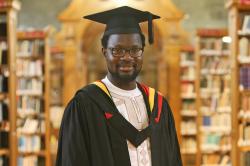Dr Ephraim Kisangala – the Bangor graduate prescribing dignity to Ugandan refugees
 A student whose work attracted the interest of the HRH Duchess of Sussex earlier in the year, graduated from Bangor University this week.
A student whose work attracted the interest of the HRH Duchess of Sussex earlier in the year, graduated from Bangor University this week.
Dr Ephraim Kisangala, 30, from Kampala in Uganda, a fully-funded Commonwealth Scholar received an MSc in Public Health and Health Promotion with distinction. He is a qualified medical doctor who holds Bachelor of Medicine and Bachelor of Surgery degrees from Kampala International University.
Ephraim, a medical practitioner in Uganda, was born of parents that were displaced by the Ugandan civil wars in the late 1980s. Raised by his single mother, Ephraim and his siblings struggled to pay for education with their meagre resources, but still he became one of the best performing students in the country.
He discovered Bangor University through the Windle Trust International, a charity that promotes education among people affected by conflicts and refugees, who nominated Ephraim to apply for a Commonwealth Scholarship to study in the UK.
Earlier in the year, Ephraim, attended an Association of Commonwealth Universities event in London to announce Meghan, Duchess of Sussex, becoming the Association’s Royal Patron. He was introduced to the Duchess and he had the opportunity to talk about his research into the problems faced by menstruating women in refugee camps in Uganda.
Ephraim explains: “This is a subject that I have focused on during my career as a medical doctor and for my MSc dissertation. It was the importance of this project that I discussed with the Duchess of Sussex. She is well read and widely knowledgeable on many things happening in the world. For example, I was amazed when she told me about how progressive Uganda’s refugee policy is. We agreed that menstruation needs to be part of the basic things that are provided if female refugees who are the majority, are to live with dignity.”
Other notable highlights during his time at Bangor was having an opportunity to participate with colleagues in the Geneva Challenge, an international contest that challenges postgraduate students to engage in an interdisciplinary effort to analyse a development issue and design solutions for it. The work submitted for the Geneva Challenge was also presented at the International Festival of Public Health in Manchester and colleague was awarded the Best Oral Presentation Prize. He also won the Johnson & Johnson Global Voices Award which enabled him to attend the Aspen Ideas Festival in Colorado, where he presented his work.
During Refugee Week in June 2019, Ephraim co-produced a drama Homework (Based on true stories) about challenges refuges face, especially in accessing education, which was performed at the Migration Museum in London.
Although having embraced student life, Ephraim did have to get used to the way English is spoken in the UK, but thinking of the people back home, and how his success would eventually contribute to their wellbeing, helped him overcome this hurdle.
About the future, Ephraim said: “I hope to study for a PhD when a funding opportunity arises. I believe that I will have much more impact in Uganda and Sub Saharan Africa with more refined and specialised skills. In the meantime, I will be returning home to continue helping improve the health of the people of Uganda. I will focus my work more in rural health care in order to attend to the needs of those who can least afford healthcare yet in most need. This will be possible as I am one of the leaders in a small local organisation providing health services and mentoring young people.
“I am more than grateful to my lecturers and supervisors that have been supportive throughout my studies in the UK. They made my stay at Bangor feel comfortable and like another home. God bless them all.”
Ephraim is a member of the Uganda Medical Association, National Menstrual Hygiene Management Committee of Uganda, and he is a Young Leader Advocate for the ‘Women Deliver’ Programme. Ephraim is currently the chairman of the Windle Trust Student Association.
Related stories:
Royal reception for Ephraim and his research
Publication date: 13 December 2019
